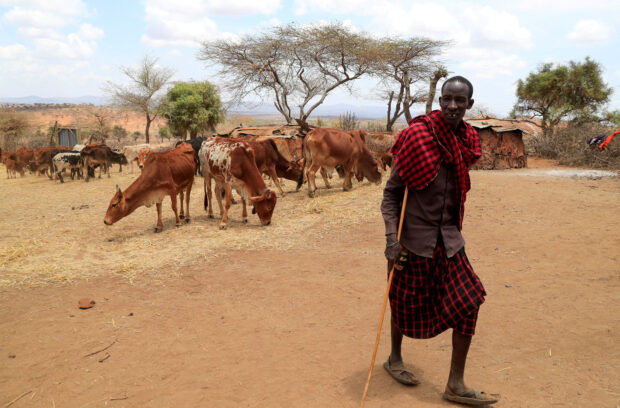Horn of Africa drought not possible without climate change–study

Ngagati Namaiduk from the Maasai pastoralist community affected by the worsening drought due to the failed rainy season, walks past his emaciated cattle during a dried-hay feeding program at their manyatta (traditional homestead) near Ilbisil settlement of Kajiado, Kenya October 17, 2022. REUTERS FILE PHOTO
LONDON — The drought that has left some 4.35 million people in the Horn of Africa in dire need of humanitarian aid – with 43,000 in Somalia estimated to have died last year – would not have been possible without climate change, according to an analysis released Thursday.
Ethiopia, Kenya and Somalia have endured five failed consecutive rainy seasons since October 2020, with aid groups labeling it ‘the worst drought in 40 years’. But while the drivers behind the drought are complex, a team of international climate scientists with World Weather Attribution (WWA) group found rising greenhouse gas emissions made it at least 100 times more likely.
“Climate change has made this drought exceptional,” said Joyce Kimutai, a climate scientist with the Kenya Meteorological Department who worked with WWA to tease out climate change’s role. She and her team found that in a 1.2C degree cooler world, the combination of low rainfall and evapotransportation “would not have led to drought at all”.
Unlike with extreme heat and heavy rainfall, scientists have a harder time pinning down climate change’s contribution to droughts around the world.
Using computer models and climate observations, the WWA team determined climate change had made the Horn of Africa’s long rains from March through May twice as likely to underdeliver, and the short rains from October through December wetter.
But the nearly 3-year drought has also coincided with a La Nina, an ocean phenomenon resulting from unusually cold water in the equatorial Pacific known to cause below average short rains in East Africa. This ultimately counteracted the excess moisture added from climate change.
“If you have a doubling of the chance of a severe drought, that really sets the stage for these sequential shocks that have devastated the region,” said climatologist Chris Funk at the University of California, Santa Barbara who was not involved in the analysis.
In addition to less rain falling on the Horn, a warming climate means more water is evaporating from soil and transpiring from plants into the atmosphere.
“This drought is primarily due to the strong increase in evaporative demand caused by high temperatures,” said Kimutai.
Despite initial predictions of a sixth failed rainy season, the region is now receiving some rain, she added.
Although it will take far more rain to help farmers and pastoralists recover, “it’s really positive that we’re seeing rainfall in the region at the moment,” Kimutai said.
RELATED STORIES